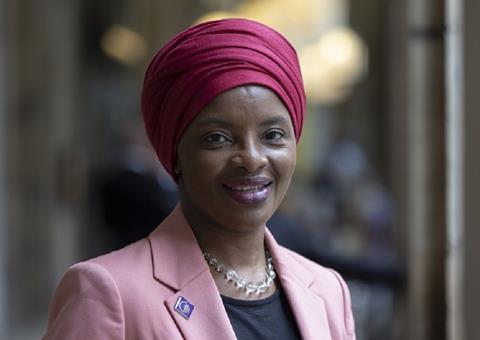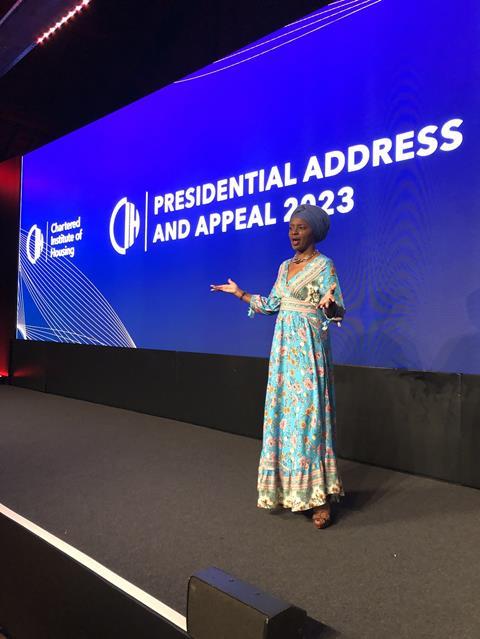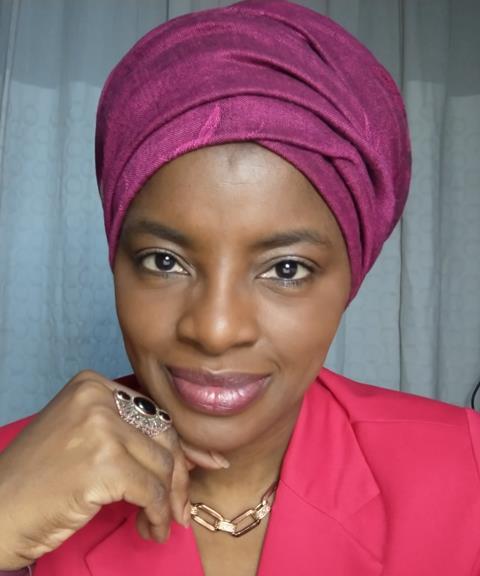Have we reached the point where boardroom diversity needs to be enforced through regulation? Lara Oyedele certainly thinks so. The ∫⁄∂¥…Á«¯ the Future Commissioner and CIH president tells Carl Brown why the time has come for a bigger stick

How do you make sure that your campaigning message is not merely going to people who already agree with you?
This is a question a rather pensive and thoughtful-looking Lara Oyedele asks as she sits down with ∫⁄∂¥…Á«¯ to discuss her long-time push for greater diversity in boardrooms and leadership teams across the UK.
“I’ve done loads of talking at conferences, seminars, webinars, you name it and what I find is that I tend to be speaking to the people that already support what I’m doing – it’s like preaching to the choir,” she says.
“Am I speaking to the right people, am I getting invited to the rooms where they are all white? Because there are plenty of all white-male boards. No, probably because they will think, ‘Oh my gosh she is going to come and tell us off’, says Oyedele.
The 56-year-old is a figure well-known in social housing circles but has her sights on a much more fundamental change to the make-up of the UK’s boardrooms across the built environment and indeed the whole economy.

This is a key reason, along with her Chartered Institute of Housing (CIH) presidency this year, why she was invited to become a commissioner on ∫⁄∂¥…Á«¯ magazine‚Äôs 12-month long ∫⁄∂¥…Á«¯ the Future Commission project, to advise primarily on our workplace, culture and leadership stream.
We join Oyedele the week before she is due to address the CIH’s annual conference in Manchester, when again she will be talking about her twin life-long passions: inclusivity and social housing.
For the uninitiated, Oyedele worked for various local authorities and housing associations before founding Black on Board Ltd during the height of publicity about the Black Lives Matter movement in 2021. The company provides mentoring and training to equip young black and minority ethnic people to become board members.
Many people, not just black and Asian people, can’t see themselves in a boardroom because it is not something they’ve thought about or thought they needed to know about
Before that she was chair of BME National, a representative body for housing associations who define themselves as BME (black and minority ethnic) organisations – meaning they cater predominantly for people from particular communities. Many of these organisations were created in the 1970s and 1980s to raise awareness of issues of race and diversity and to tackle the lack of quality housing for BME people.
She knows about this better than most, having been homeless herself as a young black teenager in Bradford. She says: “I was homeless as a teenager, then eventually got a council flat. And that’s where my passion for social housing came about because that enabled me to go back to do my A levels.”
While her love for social housing and greater equality for those from BME communities is born out of her life experience, so too is her work founding Black on Board Ltd.
She says her own first board experience – at large housing association developer Southern Housing Group between 2009 and 2012 – which she secured through a personal connection, was “wasted”.
“I had no idea what I was meant to be doing, I felt intimidated and I was just sat there thinking, ‘Oh well, can I ask this question?’ It wasn’t productive,” she says.
This for Oyedele is why training is important. Her courses focus on topics such as how to read board papers, the role of the company secretary and understanding financial concepts.
“I genuinely believe that many people, not just black and Asian people, can’t see themselves in a boardroom because it is not something they’ve thought about or thought they needed to know about,” she says.
“It is not the cleverest people in the world that are in the boardroom currently. It is about being able to read papers and ask difficult questions, that is it.”
I know from experience, if there’s two or three non-white people in the room, then you feel more comfortable about having whatever discussion you want to have because you are then speaking just as another board member rather than as ‘the black board member’
Organisations that have all-white boards are problematic. But there are also negative issues connected with having just one BME person on a company board, Oyedele says. When you have one black person, their achievement level is often higher than their white counterparts as they have had to work harder to get there, she argues.

“Having one black person on a board is not fair, it’s tokenistic. And it’s not fair on that one person because then I feel like they carry the weight of everything ‘non-white’ on their shoulders.” Sometimes this one black person doubles up as the token female also.
“I know from experience, if there are two or three non-white people in the room, then you feel more comfortable about having whatever discussion you want to have because you are then speaking just as another board member rather than ‘the black board member’”she says.
Oyedele says she is “starting” with housing as it is a world that she knows. There is also the fact that e, so arguably the pressing need for more representative boards is more evident in social housing than in other industries.
Lara Oyedele’s CV
- March 2021- present: CEO, Black on Board
- October 2022-present: President, Chartered Institute of Housing
- Sept 2020-present: Non-executive director, Housing 21
- Jan 2018-present: Chair, Hope Housing
- Sept 2016-present: Senior associate, OLMEC
- Mar 2006- Mar 2014: CEO, Odu Dua Housing Association
- Jun 2009- Dec 2013: Chair, BME National
- 2009-2012: Non-executive director Southern Housng
- 1999-2001: Housing services manager Eaves Housing
- 1996-1999: Tenant participation officer Notting Hill Housing Trust
- 1995-1996: Housing officer, Hammersmith & Fulham Council
Her CIH presidency campaign, In My Shoes, has seen her launch a whole range of activity to challenge the lack of ethnic and racial diversity in the housing sector’s boardrooms, all while raising money for Shoe Aid, a charity that distributes shoes to people who need them.
But Oyedele clearly does not want to stop at housing, with her sights set on improving BME representation in boardrooms in other parts of the built environment and beyond.
She mentions her recent reaction to coming across promotional material for a property event as an example:
“They will usually have four white men on the cover of the brochure and you look at that and think, ‘I don’t want to go there, they will just think I’m there to serve coffee.”
Oyedele says her perception from what she has heard from various people is that construction has similar issues. So what is the solution?

This is where things get interesting. Oyedele believes raising awareness of the need for inclusivity can only take you so far.
“We’ve been talking about this for at least the 30 years that I’ve been in the housing sector and just hoping that people will do the right thing hasn’t worked,” she says.
Instead, she believes a stick is needed, and is planning a petition calling on the government to ensure “diversity in leadership, particularly in the boardroom, is regulated and mandated”.
She wants the ∫⁄∂¥…Á«¯ the Future Commission to ultimately recommend regulations stating that a minimum percentage of board members and executive team members are non-white and female, probably set at 33% and 50% respectively.
Oyedele points to new Financial Conduct Authority requirements for listed companies to report on the diversity of board and executive teams with new board targets on a “comply or explain basis”.
“If its good enough for FTSE 100 companies, why is it not good enough for housing? Why is it not good enough for the whole country, for all boards across all industries?”
Oyedele’s suggestion of leadership diversity enforced for all by government would obviously be a massive step change in regulation, but what would it mean for smaller firms, whether developers, contractors or suppliers?
“It would be challenging for them and would force them to think out of the box, because as long as it’s not mandatory it will never happen, that is for certain,” she said.
“People are generally lazy in the sense they want to take the easiest route to get someone on the board as quickly as possible.”
But what about smaller firms that operate in relatively white, more rural areas of the UK? What if recruiting non-white board members is too difficult?
If it [regulation of boardroom diversity] is good enough for FTSE 100 companies, why is it not good enough for housing? Why is it not good enough for the whole country, for all boards across all industries?
Oyedele has little sympathy with this argument. Speaking quickly, with the passion in her voice, she says: “Most people who say they haven’t got black people in their area just don’t see them and, while not everywhere is like Nottingham, Manchester, Leeds or London, most areas do have black people hiding in the background.
“But I also think companies need to try. People need to make the effort to go out of their way and recruit from different places, instead of using the same three or four recruitment agencies.
“Often the candidates I work with on Black on Board won’t register with the main agencies as they think, ‘They don’t want people who look like me’.”
How companies do this will undoubtedly be a debating point for the ∫⁄∂¥…Á«¯ the Future Commission over the next few months. In the meantime, Oyedele has a speech at next week‚Äôs CIH conference in Manchester to prepare for. She will of course be banging the drum for equality, diversity and inclusion among the nation‚Äôs boardrooms.
Oyedele’s housing policy views
When it comes to housing policy, Oyedele believes we need a return to high capital spending by government on social housing. She says the current model, under which housing associations use higher rents and sell more homes to leverage their balance sheets to fund affordable housing, is neither affordable for many residents nor likely to be sustainable for housing associations for too much longer.
On planning, she favours bold action - nothing less than a “removal of the right of residents to object” to development for a period of say, 10 years, will suffice.
Some might say this is not realistic in the current environment, but as with many other of Oyedele’ s ideas, it would undoubtedly generate a fierce debate.
She says firms will increasingly find it more difficult to recruit the people they need if they do not have more inclusive boards and leadership teams. “The country is getting more and more mixed, there’s going to be a lot more young black, brown and mixed people thinking, ‘I don’t want to work for that company because nobody there looks like me’.”
She also says diverse organisations will more easily attract funding as investors increasingly look for ESG outcomes.
One thing she has purposely avoided doing is referring to the wealth of statistics and reports showing that more diverse boards make better decisions, as she believes “the business case has been made” and yet people have not listened.
“I’m going to tell my anecdotal story and maybe that will make people change their minds, cos the stats aren’t doing it,” she says with a smile.
She hopes that her stories and campaigning will achieve more cut-through than simply addressing the usual sympathetic audiences.
One thing is for sure. If her idea of regulatory enforcement of boardroom diversity for all ever becomes government policy, many more people will have to sit up and listen.

Join the in Westminster on 27 September to hear from leading figures across the construction industry and find out more about the work of the commission.
The day will include panel debates on net zero, digital transformation and building safety as well as talks from high-profile keynote speakers on future trends and ideas that could transform the sector.
There will also be the chance to feed in your ideas to the commission and to network with other industry professionals keen to share knowledge.
On the day, we will also be announcing the winner of our Future Thinkers’ Award, which will go to the most innovative idea submitted in our competition for professionals under 35-year-olds wanting to improve the built environment. The deadline for entries is Friday 18 August, and you can submit your entries by emailing buildingfuturecommission@building.co.uk
About the commission
The ∫⁄∂¥…Á«¯ the Future Commission is a 12-month project looking at radical and challenging ideas that could help transform the built environment.
The campaign aims to tap into innovative ideas, amplify them and be an agent for change.
The major project’s work will be guided by a panel of major figures who have signed up to help shape the commission’s work culminating in a report published at the end of the year.
The commissioners include figures from the world of contracting, housing development, architecture, policy-making, skills, design, place-making, infrastructure, consultancy and legal. See the full list here.
The project is looking at proposals for change in eight areas:
- Education and skills
- Housing and planning
- Energy and net zero
- Infrastructure
- ∫⁄∂¥…Á«¯ safety
- Project delivery and digital
- Workplace culture and leadership
- Creating communities
>> Editor‚Äôs view: And now for something completely positive - our ∫⁄∂¥…Á«¯ the Future Commission
>> Click here for more about the project and the commissioners
∫⁄∂¥…Á«¯ the Future is also undertaking a countrywide tour of roundtable discussions with experts around the regions as part of a consultation programme in partnership with the regional arms of industry body Constructing Excellence. There is also a young person‚Äôs advisory panel.




























1 Readers' comment